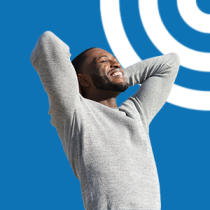It might have felt like nagging back then, but it turns out they were onto something. Good posture isn't just about looking proper and poised; it's a secret weapon for your overall health and wellbeing. So, let's dive into the world of sitting up straight and discover why it's a posture-perfect path to a happier, healthier you.
The Slouching Epidemic
In today's digital age, slouching has become an epidemic. We hunch over our computers, phones, and tablets, leading to the dreaded "tech neck." It's no wonder that so many of us are spending more time at the chiropractor's office than at the beach. But fear not! Proper posture can save the day.
The Posture-Wellness Connection
Banish Back Pain: Have you ever experienced those annoying aches and pains in your back and neck? Blame it on slouching! Maintaining proper posture aligns your spine and distributes the load evenly, reducing the risk of chronic back pain. Say goodbye to those pesky knots!
Boost Confidence: Sitting up straight makes you appear more confident and self-assured. When you exude confidence, you feel it too. So, straighten your back and conquer the world with a smile.
Improve Digestion: Good posture can do wonders for your digestive system. By sitting up straight, you create more space for your organs, allowing them to function at their best. Say goodbye to those post-meal tummy troubles!
Breathe Easier: Slouching can restrict your lung capacity, making it harder to take deep breaths. Sitting up straight allows your lungs to fully expand, providing your body with more oxygen and improving your overall energy levels.
Enhance Mood and Reduce Stress: Believe it or not, your posture can influence your mood. When you sit or stand up straight, your brain interprets it as a signal to be more positive and less stressed. It's like an instant mood booster!
Practical Tips for Proper Posture
Sit at a 90-degree angle: Ensure your feet are flat on the ground and your knees are at a 90-degree angle to your hips. Adjust your chair or use a footrest if needed.
Align your ears, shoulders, and hips: Imagine a straight line connecting your ears, shoulders, and hips. This alignment minimizes strain on your neck and back.
Take regular breaks: If you work at a desk, make sure to stand up and stretch every 30 minutes. It's an excellent opportunity to reset your posture and get those creative juices flowing.
Invest in ergonomic equipment: Consider using an ergonomic chair, keyboard, and monitor to support your efforts to maintain proper posture.
Practice posture exercises: Exercises like yoga, Pilates, and strength training can help you develop the core muscles needed to support a straight spine.
So there you have it – the importance of sitting up straight for your health and wellbeing. It's not just about looking refined and put-together; it's about feeling fantastic and living a pain-free, energized life. Good posture isn't just for your grandparents; it's for you, me, and everyone in between. So let's straighten up, stand tall, and enjoy the many benefits proper posture brings to our lives. Your future self will thank you!
With Solace, you’re not alone




